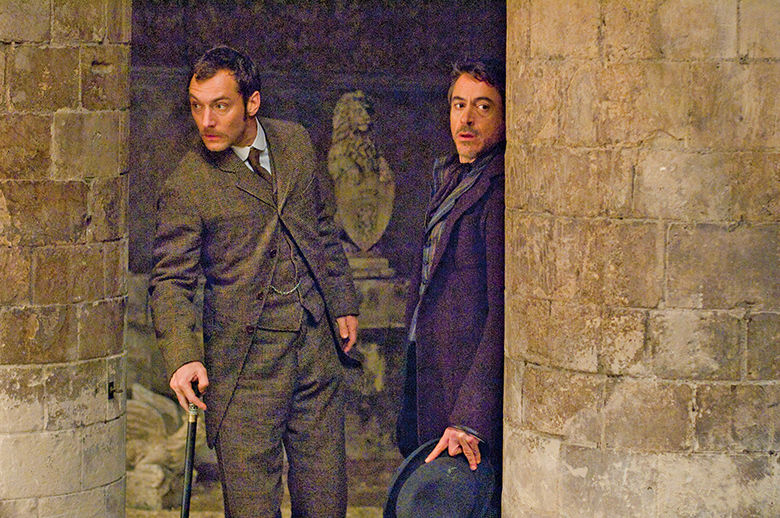Sherlock Holmes books were some of the first “serious” books I read and it was love at first sight. They were a little complicated but not impossible to follow and the stories were perfect fuel for stoking the imagination of a young reader. I revisited some of the books later in my dotage and found them just as enjoyable.
The character was so strong it generated an industry of its own. Silent movie legend John Barrymore played Holmes and Basil Rathbone really owned the part in the 1940s. There have even been renditions of a teenage Sherlock Holmes and Sir Ian McKellen is in a new release as an octogenarian Holmes. The very stylistic films with Robert Downey Jr. as Holmes have proved to be likewise well received by the detecting public.
If I really knew why this Holmes has been so popular for over a century and sold millions of books and millions of theater tickets, I would be writing this article from a chateau in the south of France thanks to my own literary creation. But like the character himself, Sherlock Holmes’ appeal will always remain a bit of an enigma.
To me, the best thing about Sherlock Holmes, and the BBC series starring Benedict Cumberbatch as Holmes and Martin Freeman as Dr. Watson, is that you don’t have to overthink anything. You can sit back and enjoy the relationship between Holmes and Watson — one of the first “buddy” pairings in literature — and marvel at the brilliance of Holmes, even though he is at times kind of irritating.
The Sherlock Holmes of the books is not very warm and fuzzy at all. The BBC series uses that premise to give a modern twist without losing the essence of the character by inserting what we now know about the mystery of people who are savants.
That’s probably why Sir Arthur Conan Doyle invented Watson, as a kind of everyman for us mere mortals without great powers of intuition and discernment to relate to. Hollywood turned Watson into a bit of a bumbling boob in the Basil Rathbone as Holmes and Nigel Bruce as Watson series. Charming as those movies are, the purist in me always thought of Watson as more of the put-upon “normal” guy who is friends with the impossibly difficult Holmes because somebody has to be.
This has been the take the almost fantasy-genre Holmes movies with Robert Downey Jr. and Jude Law have adopted and it is certainly the relationship foundation of the BBC series. The British series, which has been on for several seasons on BBC America, transplants Holmes and Watson into 21st century London. Ironically and somewhat sadly, the 19th century incarnation of Dr. John Watson can have the same backstory as the early 21st century John Watson — that of a former British military officer with an unhappy experience in a war in Afghanistan. It’s actually a sign of just how good the characters are that you can place them in other times and other places and they still work. It’s like when people stage Hamlet in 1920s Chicago or, as Orson Welles actually did, stage Macbeth within the confines of Haiti and voodoo culture.
The good news is that the BBC series is returning for another slate of new episodes. The better news is that it appears the producers of the series have decided to return Holmes and Watson to their natural habitat …Victorian London. The clickety clack of hooves as horses pull hansom cabs along cobblestone streets still glistening from a sudden downpour through the narrow alleys of Whitechapel or other dubious East End locale is what Sherlock Holmes is all about.
The risk the BBC series runs by their journey back in time is in how much luggage they intend to bring with them. When the series was based in modern day London, there were certain corresponding modern attributes that Holmes and Watson, by necessity, had to assume. Otherwise they are two completely anachronistic characters and that’s a different show altogether.
The other side of that same coin is taking actors, writers and producers from the 21st century and tasking them with presenting life in late 19th century England. There will be certain accommodations that we can all live with. Female characters in 19th century literature were not always the most well defined or given much more to do than be in distress and wait for a man to come along and rescue them.
But if Holmes and Watson, and the female characters they will encounter during the reign of Victoria Regina spout very modern sentiments about current social norms, the trip back to the past will be in vain. It’s a temptation many a television series and motion picture has fallen prey to: turning women into gunslingers and sword wielding amazons inserted into stories about the historical past. It may salve the conscience of more progressive types to have female characters in period pieces speak and act like they just jumped out of the pages of a women’s studies syllabus, but for me, it takes me out of the moment.
My hope is that Sherlock Holmes and Dr. Watson meet with a variety of interesting female characters that are true to their time yet independent and well rounded. Based on what I know of this series in the past, its future, as it journeys to the past, bodes well, and the game’s afoot.

